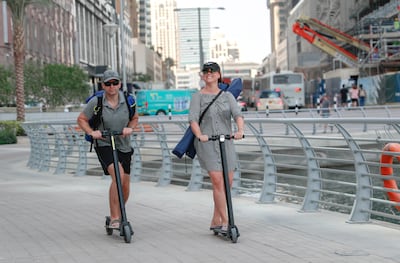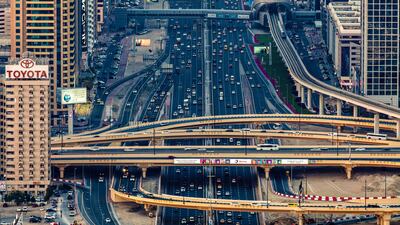Few things mark the end of the summer quite like the resumption of the school run after a weeks-long holiday.
It is that moment when families around the country shift from the lazy pockets of slumber in July and August to the unbreakable deadlines of pushing through heavy traffic and getting to the school gates on time in September. Most parents will also be familiar with that sensation of leaving the house slightly later than you should and hoping that the rhythms of morning traffic beat your way on any given day.
After 18 months of pandemic-induced disruption to school timetables and attendance, the pressure of the return to the rituals of the pre-pandemic world, combined with the growing volume of traffic on the roads that the end of the summer traditionally signals, seems tailor-made to induce such a reaction.
A recent survey conducted by Volkswagen Middle East found that 84 per cent of respondents experienced anxiety when driving.
Parents in Dubai told The National this month that traffic congestion around school zones has been “unbearable and frustrating” since the start of the school year.
Some have canvassed authorities to consider staggered school start times, as well as to introduce further traffic management measures to ease congestion, which are good ideas that could easily be used elsewhere, especially as these issues don’t just exist in Dubai.
Some of the other frustrations more broadly evident on our roads – such as tailgating, erratic driving and speeding – are undoubtedly the result of bad driver behaviour.
In August, Dubai Police reminded drivers once again to avoid speeding. This week, Abu Dhabi Police released video footage of impatient motorists tailgating vehicles in front of them and warned that anti-social behaviour on the roads can lead to serious accidents.
Police said tailgating is a leading cause of accidents in the capital and that the tariff for such behaviour was a Dh400 ($117) fine and four penalty points on the offending driver’s licence, rising to vehicle seizure and a Dh5,000 impounding fee if tailgating resulted in a road accident.
This would seem to be a powerful enough disincentive, but the force said 19,327 tailgating offences were reported in the first six months of this year.
Separately, this week Dubai’s traffic prosecutor, Salah Bu Farousha, urged drivers to follow the rules of the road and stay safe.
“Speeding, using mobile phones and failing to keep a safe distance between vehicles are the common causes of sudden collisions and lead to deadly consequences,” he said, while referencing drivers under 35 as cause for particular concern.
In 2019, 875 of the 1,360 crashes recorded in Dubai involved the under-35s and accounted for 77 deaths and 96 injuries.
The figures are stark and the warnings are multiple, not just for younger drivers but for all of us. If the early months of the pandemic forced many of us to park up and shelter at home, the return to normality has brought with it an unwelcome and maybe partially unexpected reprise of some pre-pandemic driving habits.
There are other challenges, too. The pandemic and recovery period have prompted two marked changes on our roads.

E-scooters have now been widely adopted. That blanket term for this form of transport does not, however, do justice to the multiple types these scooters now come in, moving far beyond the original motorised stand-up-and-go form of transport they were initially based on.
The National reported earlier this year that doctors have said injuries such as broken bones, abrasions and in some cases head traumas caused by e-scooter accidents or riders unintentionally dismounting have become more commonplace.
Experts have, predictably, called for riders to respect the rules of the road, but more generally, given the top speeds of some of this type of last-mile transport, it may be time to require riders to wear helmets, reflective or high-visibility clothing and to have proper lights when using e-scooters at night.
The entire space could benefit from further regulation or, at the very least, more study and prospective policy formulation, just as we have seen Abu Dhabi authorities introduce a permit-based system for cycling groups on our roads and build out a network of safe cycle paths.
A boon in home deliveries has also seemed to push more motorbikes onto our roads in the past 18 months with an associated rise in both accidents and incidents.
So how do we turn back the tide of accidents, incidents and reduce stress on the roads?
The answer is through a mix of regulation, education, behavioural change and enforcement.
Let’s be clear, however, that for the most part the regulatory framework, in the form of fines, points, bans and impoundment, is fully delivered and police cars are a visible presence on our roads.
Change will only come through all of us seeking to moderate our behaviour on the roads and better understanding risk. That comes through education programmes, further and repeated public messaging and through drivers fully absorbing how dangerous certain actions can be.
We live in an anxiety-inducing world. Let’s not compound that stress by behaving badly on our roads.


